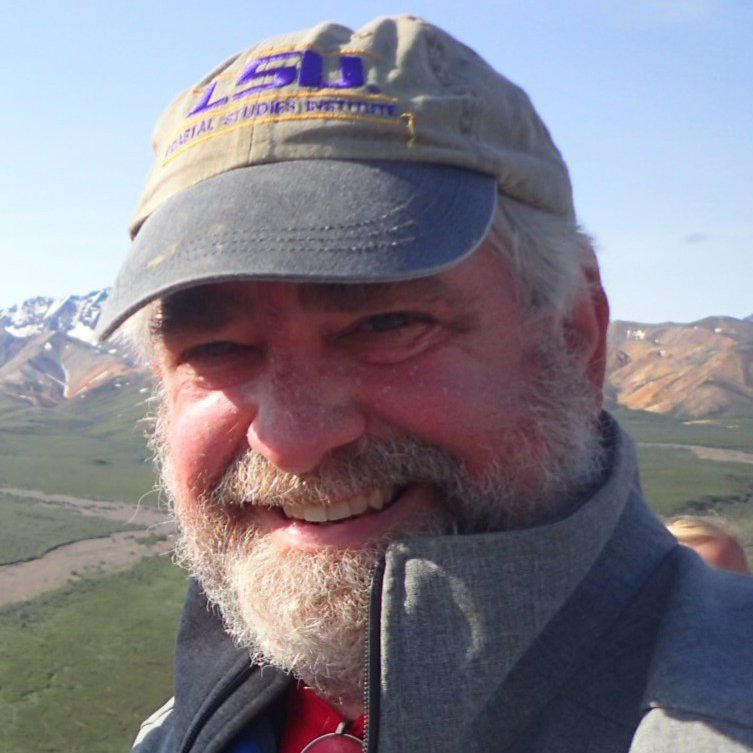2025 Keynotes and Plenaries
Monday, June 30, 2025
Dr. Samuel J Bentley
Professor and Billy and Ann Harrison Chair in Sedimentary Geology, Louisiana State University
One Geologist’s Perspectives on the Mississippi River Delta: Past, Present, and Future
The Mississippi River Delta is one of the great coastal river deltas of the world and forms an iconic coastal landmass along the Gulf Coast. The Delta and its river corridor have huge cultural, economic, and ecosystem value. The Delta has grown and evolved naturally over the last ~8000 years, as most deltas do. In the last two centuries, human actions have threatened the delta’s evolution. These threats are likely to have strong negative impacts on industrial, economic, and environmental services that the Delta provides. This presentation will review the history of the Delta and evaluate the likely future challenges.
Sam Bentley is a professor in the Louisiana State University Department of Geology and Geophysics, where he holds the LSU Harrison Chair in Sedimentary Geology, and is a fellow in the LSU Coastal Studies Institute (CSI). He recently served as Vice President for Research and Economic Development at LSU. He earned his PhD in coastal oceanography from SUNY Stony Brook in 1998 and has held faculty positions at LSU and Memorial University of Newfoundland. Bentley was named a Fellow of the American Association for the Advancement of Science in 2022. He is presently CoDirector of the Mississippi River Delta Transition Initiative (missdelta.org) funded by the National Academy of Sciences, Engineering, and Medicine, and is Principal Investigator for the OASIS Project, funded by the Bureau of Ocean Energy Management. He loves mentoring the graduate and undergraduate students in his research group. Since 1999, he has supervised 13 PhD graduates, 21 MS graduates, and eleven successful senior BS thesis students, with whom he has published over 100 peer-reviewed research articles.
Tuesday, July 1, 2025
Franziska Trautmann
Co-founder and CEO, Glass Half Full
Growing Glass Half Full: from a college backyard to a 3-acre facility
Franziska Trautmann co-founded Glass Half Full as a college student with a simple goal: to keep glass out of landfills. What started in a backyard has grown into a 3-acre recycling facility making a real impact on coastal restoration. In this keynote, she’ll share the practical steps, challenges, and lessons learned from building a mission-driven company from the ground up.
Over 8 million more pounds of glass would be in landfills if not for Franziska and her team at Glass Half Full. Started in the backyard of a college fraternity house in New Orleans, Glass Half Full recycles glass into sand for coastal restoration, disaster relief, construction, and more. Franziska, a Carencro, Louisiana native, graduated with a degree in chemical engineering from Tulane University. This gave her the skills necessary to help lead a research team backed by the National Science Foundation, conducting novel research on the use of recycled glass sand for coastal restoration. They have completed four coastal restoration projects, restoring 1,700 meters of coastline and counting. In her spare time, Franziska makes educational TikToks ranging from recycling to climate change to wastewater treatment. Her page has garnered over 300,000 followers and millions of views.
Tuesday, July 1, 2025 — Stegner Lecture
Dr. Tommy Michot and Les Freres Michot
Research Biologist and Musician, USGS, University of Louisiana (retired)
Cultural and Environmental Influences in the Lyrics of Cajun Songs
Originally from France, the Acadian people (“Cajuns”) came to inhabit the coastal marshes, bayous, and prairies of south Louisiana after being deported from coastal Canada in the mid 18th century. Making their living off the land in these isolated wetlands resulted in the retention of their unique language and culture well into the 20th century and influenced their music. Les Freres Michot will perform a number of songs that exemplify the close connection that the Cajun people have with the land and environment. Each song will be prefaced by a short introduction explaining the lyrics and connections to various features of the landscape, environment, and culture of the Acadian region. Instrumentation includes accordion, violin, triangle, acoustic guitar, and acoustic bass.
Dr. Thomas Claud Michot is retired from the Institute for Coastal and Water Research, University of Louisiana at Lafayette, and from the USGS Wetland and Aquatic Research Center. Dr. Michot’s research focus over his career has been on the ecology and management of coastal marshes, mangroves, and seagrass beds in the Gulf of Mexico and Caribbean Sea, and how wintering waterfowl and other birds use those habitats. His projects have investigated waterfowl foraging ecology along Gulf coast; distribution and abundance of colonial waterbirds and waterfowl in Louisiana, Arkansas, Texas, and Mexico; habitat requirements of ivory-billed woodpeckers; submersed aquatic vegetation in Louisiana and Florida; saltmarsh dieback in coastal Louisiana; coastal emergent marsh, seagrass, and mangrove vegetation communities along the Gulf of Mexico and Caribbean coasts; hurricane impacts to coastal habitats in Louisiana, Honduras and Guatemala. Dr. Michot is considered to be one of the world's foremost experts on the ecology of redhead ducks. Tommy is bilingual and of Acadian descent, and he plays accordion and sings in a traditional Cajun band, Les Freres Michot, a band that has been together for more than 40 years and has represented south Louisiana in performances all over North America and Europe.
Wednesday, July 2, 2025
Christine Verdin
Principal, École Pointe-au-Chien
The Importance of Traditional Ecological Knowledge and Community Buy-in for the Success of a Local French Immersion School
Christine Verdin is an educator, champion of local culture, and advocate for tribal communities in Louisiana. Born into the Pointe-au-Chien Indian Tribe (PACIT) along the bayous of Terrebonne Parish she has lived at the intersection of nature and culture. Her first language is Indian French, which has positioned her well to become the first principal of the first French immersion school that primarily service Native American children, École Pointe-au-Chien. This school is also the first Ocean Guardian school in the state of Louisiana. Before assuming the role of principal, she worked as a master teacher at Pointe-aux-Chenes and Montegut elementaries, served as the PACIT’s delegate to the National Congress of American Indians, and advocated for her tribe’s needs during disasters (most notably the BP Oil Spill and Hurricane Ida). And she continues this work—bridging generational knowledge on language, nature, culture, and history—with the students at École Pointe-au-Chien.




